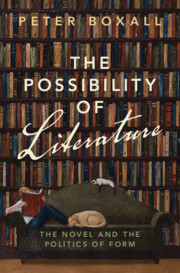Book contents
- The Possibility of Literature
- The Possibility of Literature
- Copyright page
- Dedication
- Epigraph
- Contents
- Figures
- Acknowledgements
- Introduction
- Part I On Writers
- Part II On Literary History
- Chapter 7 The Threshold of Vision
- Chapter 8 The Anatomy of Realism
- Chapter 9 Back Roads
- Chapter 10 Blind Seeing
- Chapter 11 Mere Being
- Part III On the Contemporary
- Notes
- Bibliography
- Index
Chapter 8 - The Anatomy of Realism
Cervantes, Coetzee and Artificial Life
from Part II - On Literary History
Published online by Cambridge University Press: 10 October 2024
- The Possibility of Literature
- The Possibility of Literature
- Copyright page
- Dedication
- Epigraph
- Contents
- Figures
- Acknowledgements
- Introduction
- Part I On Writers
- Part II On Literary History
- Chapter 7 The Threshold of Vision
- Chapter 8 The Anatomy of Realism
- Chapter 9 Back Roads
- Chapter 10 Blind Seeing
- Chapter 11 Mere Being
- Part III On the Contemporary
- Notes
- Bibliography
- Index
Summary
Cervantes’s novel Don Quixote has exerted a unique influence on the history of the novel, because it tests, more exhaustively than any other, the bonds that tie fiction to the world that it partly invents.
This essay argues that the work of J. M. Coetzee is shaped, to a significate degree, by his long dialogue with Cervantes, which turns around a critical examination of what is here called the ‘anatomy of realism’ – the capacity of realist works of art to enter into the structuring of our life worlds. Coetzee’s engagement with Cervantes can be felt throughout his writing career, but it comes into particularly sharp relief in his later work, and particularly in his 2013 novel The Childhood of Jesus. It is in this work, the essay argues, that Coetzee’s reanimation of Don Quixote is most productive, as it reaches towards a dramatically shifted conception of realism, and of the relation between the imagination and the world.
- Type
- Chapter
- Information
- The Possibility of LiteratureThe Novel and the Politics of Form, pp. 169 - 186Publisher: Cambridge University PressPrint publication year: 2024

